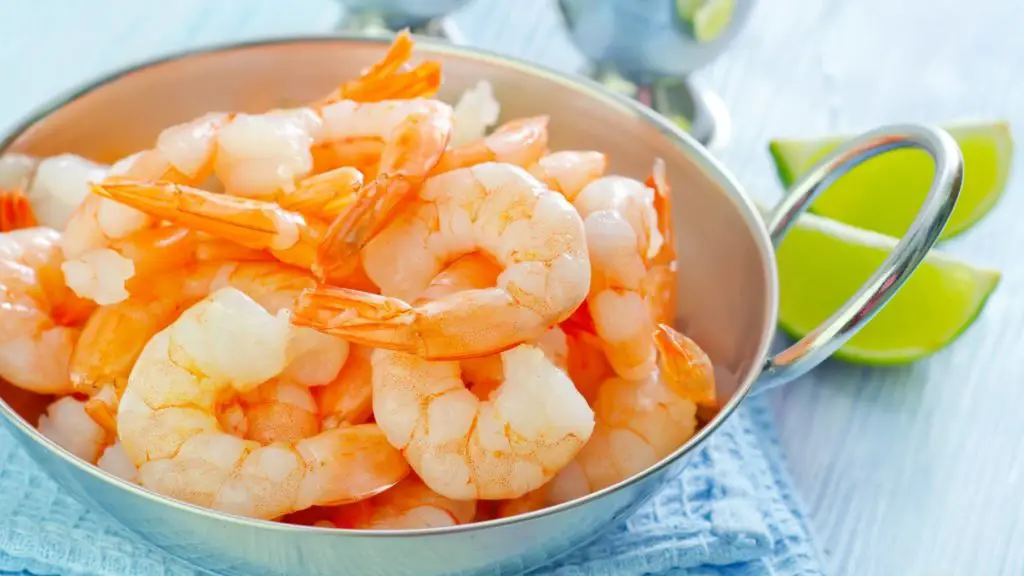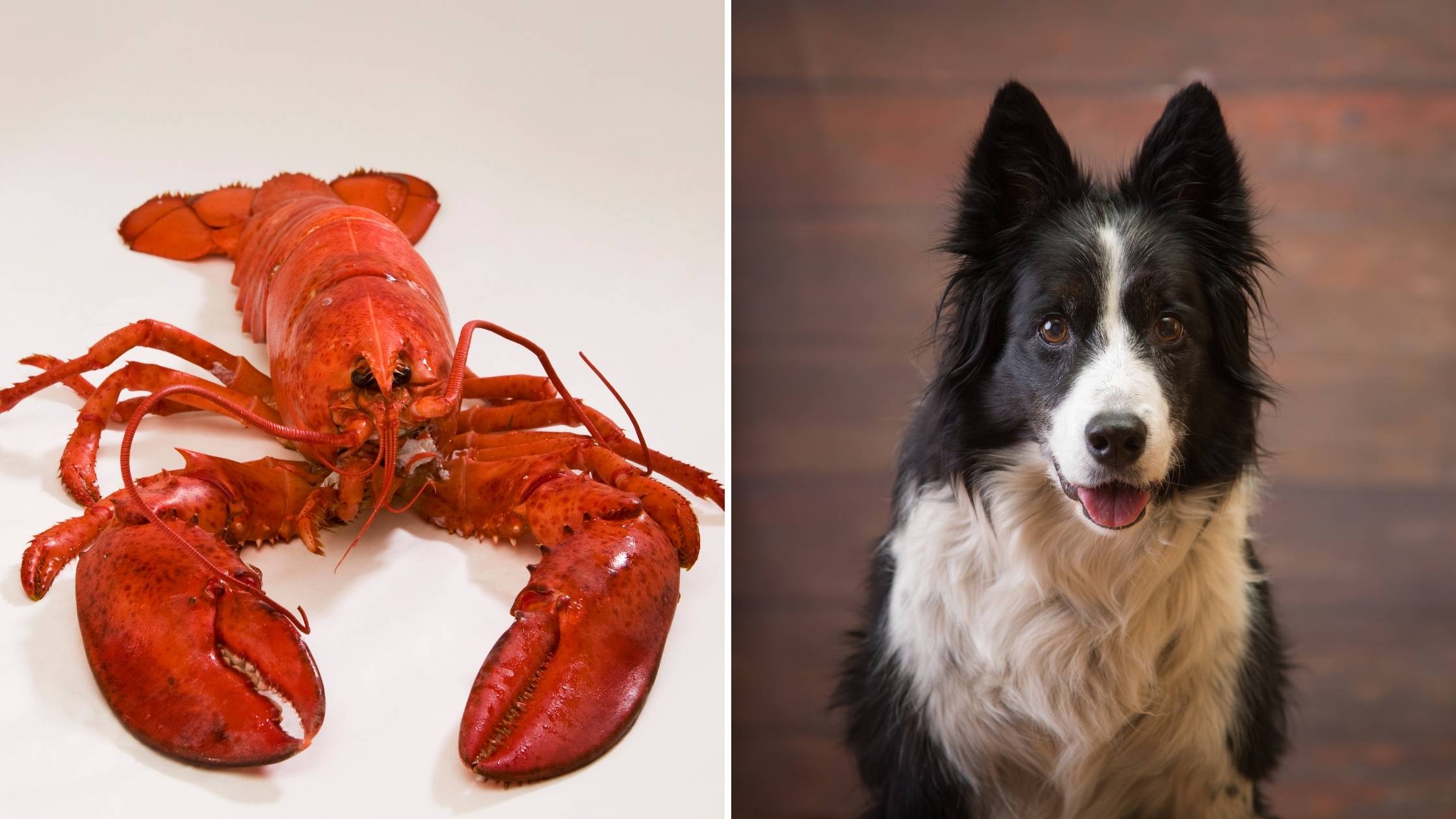Since dogs love meat, it would make sense that they can and should eat lobsters as well, right? Not necessarily. Dog’s digestive systems are very different to ours, so it’s important to choose which foods you give them, and in what form, very carefully.
Here, we look at all the benefits and side effects of lobsters for dogs, the recommended serving size and more.
Can Dogs Eat Lobster?
Yes, dogs can eat a bit of lobster as a rare treat. However, dogs can only eat clean and cooked lobster meat because parts like the shell can be dangerous. Some dogs may also be allergic to lobster, so not all dogs can eat lobster and it’s something to be approached with care.

What Is Lobster?
A lobster is an animal that is part of the crustacean family. Lobsters have strong tails and long bodies. Lobsters have five pairs of legs, three of which have claws. These creatures live in burrows or crevices on the ocean floor.
What Happens if a Dog Eats Lobster?
Dogs that eat a little lobster may not experience any harmful reactions. In most cases, nothing will happen to many dogs that eat a bit of lobster. Most dogs would be fine if they eat a little lobster if it was adequately cleaned and cooked and if the dog only ate a small amount of flesh.

However, there is a rare chance that a dog can experience negative symptoms like hives or vomiting if the dog is allergic to lobster. If the dog consumes a lot of lobster in a short time, it could develop health problems like high cholesterol levels and heart disease. Additionally, the lobster shell is a choking hazard for dogs, especially small dogs.
Is Lobster Bad for Dogs?
No, lobster is not always bad for dogs. A bit of clean and cooked lobster flesh for most dogs is ok as a rare treat. However, lobster is not an appropriate food replacement for a dog’s regular diet. While lobster is a good source of protein, it also contains a lot of cholesterol and sodium.
Health Benefits of Lobster for Dogs
Lobster is full of protein, which is important for all dogs. Dogs need protein-heavy diets, so it is a great protein-rich treat for pooches. 400-500 grams of lobster contains over 70 grams of protein. Of course, a dog should not consume anywhere near that amount of lobster. Lobster is only meant to be a small, occasional treat for dogs that is full of protein.
Lobsters are also packed with vitamins that are excellent for a dog’s health. For instance, lobsters have vitamin C that is an antioxidant and supports the immune system. It also contains vitamin D that protects a dog’s bones and teeth. Some other vitamins lobsters contain are vitamin A, B6 and B12.
Dogs can also benefit from the minerals that lobsters have. Lobsters contain iron, which helps carry oxygen throughout the body in the red blood cells to produce energy. Iron is also important for some enzymes in a dog’s body to properly function. Lobsters also have magnesium that can prevent seizures, muscle spasms, etc. Magnesium facilitates the transfer of energy each time a dog thinks, has a heartbeat and moves a muscle.
Will Lobster Make Dogs Sick?
Clean and cooked lobster meat will not harm healthy dogs in small amounts. However, raw lobster can harm a dog’s body, especially if the dog has a sensitive digestive system. All living organisms, including lobsters, have parasites. The parasites can stay in the dog and make them sick.
It is also important to note that some dogs may have seafood allergies that lobster can trigger. Some dogs can suddenly develop a seafood allergy, so they could have an allergic reaction to lobster randomly. Common symptoms of allergies in dogs include itchy skin, hives, hair loss, runny eyes and nose, etc.
Most medications prescribed by a vet can treat the side effects that seafood allergies cause. If a dog only ingests a little lobster and develops an allergic reaction, they may only need rest and water. In rarer and more serious cases, allergic reactions can cause anaphylactic shock. Dogs would immediately go into anaphylactic shock if there is a severe reaction, and that requires immediate medical attention.
Potential Side Effects of Lobster for Dogs
Some dogs may get worse symptoms of high blood pressure when they eat too much lobster. Lobster contains a lot of sodium, which can worsen symptoms of high blood pressure. Moreover, excess sodium can increase a dog’s risk for heart disease and stroke. Humans cannot have too much lobster because of the sodium, so dogs would be more sensitive to small portions of lobster.
Lobster also contains a lot of cholesterol. About 100 grams of lobster contains 146 grams of cholesterol. That amount can be fine on occasion for healthy people as a treat, but dogs have much smaller bodies than humans. The high cholesterol levels lobster contains can cause diarrhea, vomiting, seizures, hair loss, etc., in dogs. Dogs that are overweight or have other underlying conditions are usually more susceptible to the negative effects of high cholesterol.
As mentioned earlier, lobster could also cause allergic reactions in some dogs. Some dogs may only experience a bit of itchiness and runny eyes and nose. However, even the less threatening side effects of seafood allergies can cause some longer issues. For instance, a seafood allergy can cause severe itching that leaves a temporary bald spot on a dog.
Can Dogs Eat Cooked Lobster?
Yes, dogs can eat cooked lobster. In fact, dogs should only eat cooked lobster. Raw and improperly cooked lobster can contain dangerous parasites and bacteria that can make dogs sick, especially if it is not treated right away. Therefore, dogs should only eat cooked lobster to avoid getting sick.
Can Dogs Eat Lobster Meat?
Yes, dogs can eat lobster meat. Lobster meat is the only part of the lobster that dogs can safely eat. The lobster they can eat should be free of other lobster parts, like the shell. However, it is not ideal to incorporate lobster into their daily diets because of its high sodium and cholesterol levels.
Can Dogs Eat Lobster Shell?
No, dogs cannot eat lobster shells. A dog’s digestive system is not strong enough to safely digest the sharp and hard shell. The sharp shell can cut and irritate a dog’s throat, stomach and intestines. Moreover, the shell poses a huge threat of choking in dogs, especially for small dogs. The shell can easily get stuck in a dog’s throat, causing them to choke.
What Parts of the Lobster Are Poisonous to Dogs?
No part of the lobster is directly poisonous to dogs. However, improperly cleaned and undercooked/raw lobster can contain parasites and bacteria that create negative impacts on a dog’s health. The shell can also be dangerous because it is a choking hazard, but it is not poisonous.
Can Dogs Eat Shrimp?

Since lobster is similar to shrimp, many dog owners wonder if their pups can also eat shrimp. Most dogs can eat shrimp if they are not allergic to it. Shrimp is a good source of protein while also being low in carbs, calories and fat. However, shrimp is high in cholesterol like lobster, so it is not ideal for a dog’s daily diet. Therefore, cooked shrimp can be a good but rare treat for dogs.
How Much Lobster Can Dogs Eat?
Most healthy adult dogs can eat a few small bites of lobster meat. Small dogs should only eat 1-2 small bites because their bodies are smaller. Lobster should only be a rare treat, so dogs can have this treat every other month. However, it is also fine if a dog never eats lobster, especially if the dog is sick, has other health conditions, overweight, etc.
How to Feed a Dog Lobster
Firstly, choose fresh lobster to avoid stomach aches and other side effects. Next, be sure to clean and wash the lobster thoroughly to remove excess dirt. Thoroughly boil or steam the lobster until it is fully cooked. Dogs should not eat raw or undercooked lobsters because they can contain harmful bacteria and parasites.
When cooking lobster for dogs, it should not contain other ingredients. Many people use ingredients like salt, pepper, butter, etc., to enhance the overall lobster flavor. However, these extra ingredients are not good for dogs. Therefore, pet owners should only feed steamed or boiled lobster to dogs that are free from other food products.
It is important to introduce any new food to a dog slowly. As mentioned earlier, dogs can be allergic to food, so it is ideal to test out the food first. Dogs that never ate lobster before can have a small bite of cooked lobster flesh. Observe the dog for the rest of the day. If there are no side effects, the dog can have lobster meat again in the next month or so.
Can Puppies Eat Lobster?
No, puppies cannot eat lobster. Properly cleaned and cooked lobster may not directly harm puppies, but it is not ideal for their development. A good rule of thumb is to stick to a regular puppy diet that supports their growth. Moreover, puppies have more sensitive bodies than adult dogs. Some puppies may have a negative reaction to the new food and experience side effects like vomiting, stomach pain, etc.
In Summary
Lobsters are safe for dogs to eat in small quantities as an occasional treat. It contains a lot of protein, vitamins and minerals that are great for pooches. However, it also contains a lot of sodium and cholesterol, which is bad for dogs, especially if the dog is overweight or has other health conditions.

